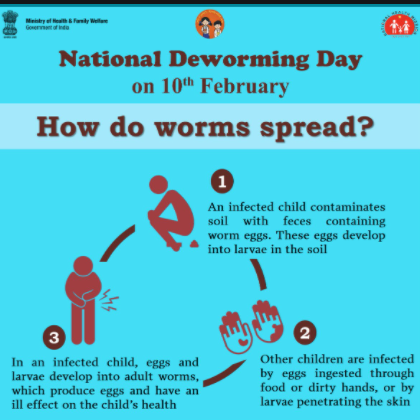Soil-Transmitted Helminthiases (STH): A Public Health Concern
Soil-Transmitted Helminthiases (STH), also known as parasitic intestinal worm infections, pose a significant public health issue, particularly in low-resource settings. These infections can have detrimental effects on children's physical growth, well-being, and can lead to anemia and undernutrition. Regular deworming, as advised by the World Health Organization (WHO), eliminates worm infestations among children and adolescents in areas with a high STH burden, thereby improving nutrition and health outcomes.
National Deworming Day (NDD)
Launched in 2015, National Deworming Day (NDD) is a flagship program of the Ministry of Health and Family Welfare. The program is implemented biannually as a one-day initiative through schools and Anganwadis. Albendazole, an anti-parasitic tablet approved by the WHO, is used to treat intestinal worms in children and adolescents as part of Mass Drug Administration (MDA) programs globally. In the last round of deworming earlier this year, which had been delayed due to the COVID-19 pandemic, 11 crore children and adolescents across 25 States/UTs were administered Albendazole tablets.
STH Prevalence and Mapping in India
According to the WHO’s 2012 report on STH, an estimated 64% of children aged 1-14 years in India were at risk of STH, based on hygiene and sanitation practices and limited STH prevalence data. To better assess the exact burden of STH, the Ministry of Health and Family Welfare appointed the National Centre for Disease Control (NCDC) as the nodal agency for nationwide baseline STH mapping. By the end of 2016, NCDC, in collaboration with partners and government agencies, completed the baseline mapping across the country. The findings revealed varied prevalence, ranging from 12.5% in Madhya Pradesh to 85% in Tamil Nadu.
Impact of National Deworming Day (NDD) Program
To evaluate the impact of the consistently implemented high-coverage NDD program, the Health Ministry recently initiated follow-up prevalence surveys, led by NCDC and partners, with guidance from the High Level Scientific Committee (HLSC) appointed by the Ministry. As of now, follow-up surveys have been completed in 14 States, all of which have shown a reduction in prevalence compared to the baseline survey. States like Chhattisgarh, Himachal Pradesh, Meghalaya, Sikkim, Telangana, Tripura, Rajasthan, Madhya Pradesh, and Bihar have shown substantial reductions in worm prevalence.
For example, Chhattisgarh has successfully conducted 10 rounds of NDD, with a significant drop in prevalence from 74.6% in 2016 to 13.9% in 2018. Sikkim, after 9 rounds, saw a reduction from 80.4% in 2015 to 50.9% in 2019. However, Andhra Pradesh, with 9 rounds, saw limited reduction from 36% in 2016 to 34.3% in 2019. Rajasthan, which implemented an annual round due to a low baseline of 21.1% in 2013, achieved a remarkable reduction to less than 1% in 2019.
Future Analysis and Recommendations
Further analysis is being led by the HLSC and experts at NCDC, with careful consideration of the WHO decision tree for STH control regarding treatment frequency. This will align with the program's factors and ensure the sustainability of gains achieved thus far.
Collaborative Effort and COVID-19 Adaptations
The implementation of NDD is led by the Ministry of Health and Family Welfare, in collaboration with the Ministry of Women and Child Development, Ministry of Education, with technical assistance from the WHO and other technical partners. The Health Ministry remains committed to continuing essential health services while managing the ongoing COVID-19 pandemic. With schools and Anganwadis closed, frontline health workers have been trained to follow COVID-19 safety guidelines while administering Albendazole tablets to children and adolescents (aged 1-19 years) during home visits or through a staggered Village Health Sanitation and Nutrition Day (VHSND) model between August and October 2020. This revised approach ensures the continuity of deworming efforts while minimizing pandemic-related risks.


